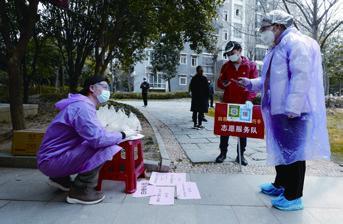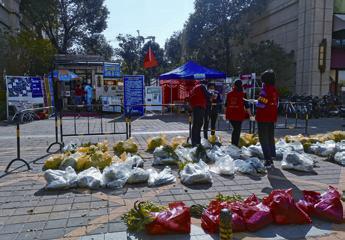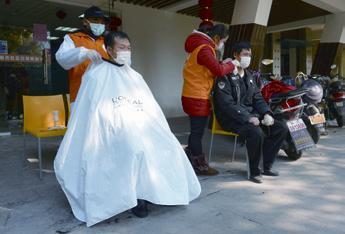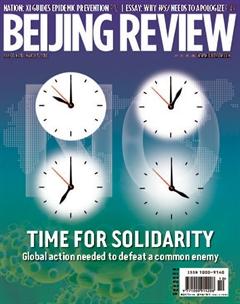Ready to Serve
By Zhao Wei



During normal times, Hua Yuchen is a music teacher. But since the outbreak of the novel coronavirus disease 2019 in Wuhan in Hubei Province in central China, she has become adept at juggling multiple tasks. Working as one of the army of volunteers who are complementing the authorities work to prevent and control the epidemic and keep life going in the lockeddown city, the 30-year-old takes up whatever assignment she is given.
“I have worked at a toll station to take peoples body temperature, as a volunteer driver to transport medical staff, and a porter to deliver supplies. Now I am an announcer at a temporary hospital,” she said at a recent press conference to introduce Wuhans nonclinical frontline workers. “I play music on the public address system, give the news, and read out encouraging articles for patients. Although I am not a professional announcer, I hope my work gives hope to people.”
She asks the nearly 400 patients in the hospital to keep their morale up through her announcements. “Maybe we are not the persons you want to be with right now, but at this moment we are close,” went one typical announcement. “My friends, please smile at the people around you and say thank you to the medical staff. I believe you will recover soon and go back home in good health.”
As Wuhan residents are required to live in self-isolation in their apartments to prevent infection, volunteers have been recruited to deliver food and other essential articles for them, run other errands and even take care of the pets of those unable to do so. Not only in Wuhan, volunteers in other places are also playing an essential role in epidemic prevention and control in different ways.
Organized assistance
In Zigong, the third largest city in Sichuan Province in southwest China, the local Lingxi Volunteers Association has recently recruited over 1,000 volunteers to serve in railway stations, highways and communities to help with epidemic prevention and control. They deliver supplies, record information, distribute epidemic prevention manuals and provide other assistance.
In Suzhou, a city in Jiangsu Province in east China, 57-year-old barber Yu Duntao gave free haircuts to nearly two dozen members of a community in the vicinity of the Suzhou Industrial Park, together with another volunteer named Huang Jisheng on February 24. That is a day when people traditionally get their fi rst haircut after the Lunar New Year.
“People want to get a haircut on this day but a lot of barber shops have been closed due to the novel coronavirus outbreak. So we are glad to have Yu and Huang come to help,” Gu Yanqiu, the community staff responsible for recruiting and managing volunteers, told Beijing Review.
In Suzhou, all volunteer-recruiting information is posted on the Suzhou Volunteer Wisdom Cloud Service Platform, through which volunteers can apply to take part in activities and projects they are interested in.
“Before an activity, volunteers receive related information and a QR code on their mobile phones for further details. After the activity, the system records the event they have attended and the number of hours they have volunteered,” said Pan Xiaoyun, the residential committee director of the community.

While the Suzhou Volunteer Wisdom Cloud Service Platform is a local digital platform for volunteer services, Chinavolunteer. cn, launched on Jan 23, 2017, is a national one covering 31 provinces, municipalities and autonomous regions of China.
The Ministry of Civil Affairs (MCA) initiated the construction of an information system at the end of 2015 to implement the Central Governments requirements of informatization of volunteer service and develop the service. The information system provides services to the public, volunteers, voluntary service organizations and voluntary service management departments. Through it, people can register as volunteers and voluntary service organizations can recruit and manage volunteers.
Also, the platform helps the government to keep abreast of the situation in voluntary services and analyze the data to illuminate decision making. By February 25, 146 million people had registered on Chinavolunteer.cn. They had provided services for over 3 million projects.
A cultural element
Volunteers have always had a special place in Chinese history and culture, which regard helping others as a virtue. One of Chinas best loved volunteers is Lei Feng, a young army recruit held up as a role model in the 60s for helping others selfl essly. Though he died in an accident, his legacy lives on, and the annual Learn From Lei Feng Day, March 5, is a reminder for people to help others.
Volunteers have rushed in during emergencies, donating blood and offering services during floods and earthquakes. They have also been an integral part of international events such as the Beijing 2008 Olympic Summer Games and the 2019 International Horticultural Expo. They have been working in China and outside. In Africa, they help run schools and protect wildlife. They have been teaching in the U.S., buying school supplies for youngsters in Syria, and doing community services in Canada and elsewhere. The volunteers, ranging from teenagers to retirees, say the act reinforces their feeling of being a part of society and being needed.
In the mid-1980s, the MCA called for community volunteer services and in the early 1990s, the China Youth Volunteers Association was established. With an increase in the number of volunteers and volunteer organizations, the need for standardized management and institutional supervision of volunteers was felt and from 1999, related regulations began to be established at the provincial level. Guangdong Province in south China was the first to issue such regulations.
On September 6, 2017, the State Council, Chinas cabinet, issued the fi rst national regulation on volunteer services, which went into effect on December 1, 2017. The regulation states that all volunteer services must be free, honest and legal and volunteers should be informed in advance about the activities to engage in and the risks involved. It requires governments at and above county level to promote volunteer services, set aside an appropriate budget to fund such services and commend and reward volunteers and voluntary service organizations that have made outstanding contributions to the development of volunteer services.


The regulation also states that overseas volunteer service organizations and volunteers should obey related Chinese laws and regulations when carrying out volunteer services in China. It encourages enterprises and other organizations to hire candidates with voluntary service records on a preferential basis.
“It provides a fundamental guarantee for the standardization and normalization of Chinas volunteer services, and is an important symbol of the accelerated institu- tionalization of Chinas volunteer services,”social study expert Lu Shizhen said in an article.

